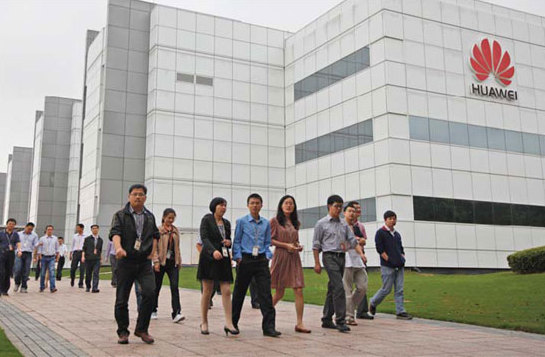Report hurts long-term trade prospects
Updated: 2012-10-22 14:22
By Zhang Yuwei (China Daily)
|
|||||||||||
|
 |
|
Employees of Huawei Technologies Co Ltd, the Chinese telecom equipment maker mentioned in the US congressional panel report, walk past the company office in Shenzhen, Guangdong. Tyrone Siu / Reuters |
Actions on Chinese firms smacks of trade protectionism: Experts
From New York subway-train ads featuring its handsets to slick, national TV commercials introducing its name, China's Huawei Technologies Co has been working to raise its profile in the United States.
A recent congressional report, however, has drawn unwanted - and, Huawei says, unwarranted - attention to the world's second-biggest maker of telecommunications equipment.
On Oct 8, the Intelligence Committee of the US House of Representatives issued a report claiming that Huawei and ZTE Corp - another Chinese telecommunications-gear provider that has established an American presence - pose a threat to national security and "cannot be trusted".
At a hearing in September, the committee raised questions about Huawei and ZTE. Citing its own and others' investigations, the panel said it "took seriously recent allegations of backdoors, or other unexpected elements" that the two companies installed in their software at the request of the Chinese government as well as their business activities in Iran.
After a year-long probe, the committee recommended in its report that regulators block any acquisition or merger involving Huawei or ZTE, through the Committee on Foreign Investments in the US; advised the federal government against using equipment from the companies; and said American businesses should buy telecommunications equipment from other vendors.
Huawei's corporate senior vice-president, Charles Ding, and ZTE senior vice-president for North America and Europe, Zhu Jinyun, denied all of these allegations at the September hearing.
Much of the House committee's claims stem from the Chinese companies' links to the People's Liberation Army and the central government in Beijing, as well as complaints that it has stolen technology from competitors.
However, Huawei has said when founder Ren Zhengfei set up the company in 1987, he had already left the PLA.
In May, a congressional delegation that included some members of the Intelligence Committee made a fact-finding trip to China, where they met with the chairman of Huawei's board of directors and officials from ZTE. Both companies are based in Shenzhen, a manufacturing hub in southern China.
Clif Burns, a lawyer in the Washington office of Bryan Cave LLP who specializes in export controls and economic sanctions, points out that the report reiterates general accusations about the two companies but doesn't present evidence supporting the claims.
Burns described the report as a "two-man" draft of a document that struck him as "very odd". The report doesn't state whether its conclusions were endorsed by any of the other 18 members of the committee.
"I think it's a publicity stunt," Burns says. "I don't think anybody is going to stop dealing with Huawei and ZTE because of this, nor should they."
Huawei's US spokesman, William Plummer, told reporters in Washington the day after the report's release that the committee's recommendations to block Huawei and ZTE's access to deals or business opportunities could set "a monstrous market-distorting precedent which could be used against American companies doing business overseas".
Related Stories
It's time for Chinese business to turn on the lights 2012-10-19 17:37
Blocking investment hurts US more than China 2012-10-19 15:45
China urges US to create fair investment environment 2012-10-19 14:27
US 'national security' excuse backfires 2012-10-19 13:26
Report: No evidence of spying by Huawei 2012-10-19 13:11
Today's Top News
President Xi confident in recovery from quake
H7N9 update: 104 cases, 21 deaths
Telecom workers restore links
Coal mine blast kills 18 in Jilin
Intl scholarship puts China on the map
More bird flu patients discharged
Gold loses sheen, but still a safe bet
US 'turns blind eye to human rights'
Hot Topics
Lunar probe , China growth forecasts, Emission rules get tougher, China seen through 'colored lens', International board,
Editor's Picks

|

|

|

|

|

|





